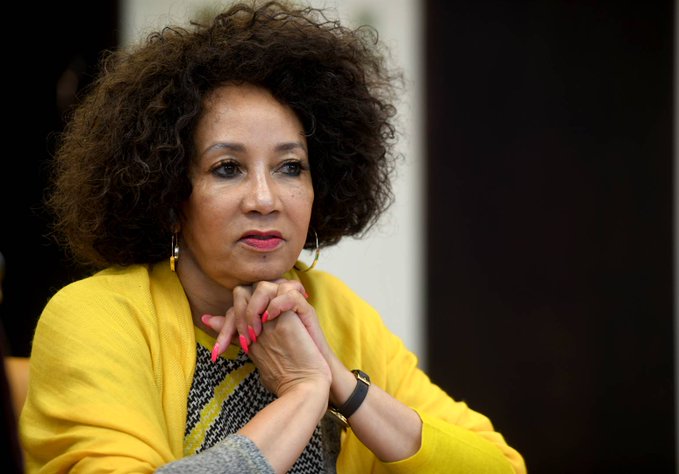We prayed for justice, equality, and freedom but that prayer was never answered. Not by the judiciary, the executive, nor the legislature. This is evident to everyone. Look at the townships, at the homelessness, at the exploited, at the ones killed for asking for better wages.
You don’t have to look far to see that South Africa is a country in ruin and this we must not be afraid to point out regardless of the positions we hold. In fact, the more influential the position, the louder our screams must be. It is for this reason that I was excited by Lindiwe Sisulu’s opinion piece on the derelict state of our country. Her opinion clearly ruffled the feathers of those comfortable with the status quo. It made those who believe their word is final tremble in their green gowns.
It is not new information that the majority of South Africans (Blacks) are not active participants in South Africa’s economy. There have been studies and research conducted that demonstrates how Black people are systematically excluded from accessing and being players in the economy. The land question has been spoken about so much that it has become trite. As paramount as it is, the repeated failure to address it has almost rendered it a meaningless slogan.
What Sisulu did with her piece is not speak of these issues as if they magically happened. She did not beat around the bush but stated clearly that there are people behind and responsible for sustaining this sickeningly unequal country. No doubt the government (executive, judiciary, legislature) have within their vested powers to address the economic and land crisis in this country. But why have they not done so?
There are no ambiguities here, the South African judicial system, as Sisulu suggests, is nothing but a rip-off of Western judicial system. Everything from the attire to the lenses used to interpret the law is clearly plagiarised form the West. There has not been any effort to introduce an African way of approaching justice. Where an African perspective is taken it is always in passing. Justices will mention Ubuntu just to give their judgments a semblance of African-ness but it does not go further than that. Similarly with our legislators, they will mention the importance of land but nothing in their drafting of legislation corroborates this importance. The executive will use ‘Africa’ and ‘Black child’ to mobilize support and votes but after this they go back to their cozy suburbs and strategise how they will protect the wealth of their white masters.
An African ideological grounding acknowledges that, to us Black people, land is life. It is much more than property, it signifies our being in the world. Without land we cease to exist, we are locked in an ontological dilemma. If the government, which includes the judiciary, understands this then why is it that they have not collectively made means to ensure that land is redistributed? If there is any African-ness in them, why is it that we are still living like pariahs in our own land? Sisulu has answered this. The majority of our leaders are nothing but ‘house negroes’ who are comfortable with maintaining the affairs of those who colonised us as long as they get some crumbs. If our Black brothers in power are interested in balancing the economic scales then why is it that white people still control the wealth of this country? This is only possible through collaborators in the legislature, executive, and judiciary.
Certain people are offended by Sisulu’s comment that the justice system needs an overhaul and does not work for Africa and Africans. This is perhaps because the supremacy and capacity of judges is hardly questioned. Judges, much like all of us, are human and susceptible to faults and idiosyncrasies that play a huge role in how they relate with the world. It is because of this that we must be able to question them, interrogate them without fear of being threatened. Judges, no matter how big their voices, are not God. They are fallible and where we see fault in them we must be able to speak out. This goes to all the other arms of government. To do this will not only move us forward as country but it also strengthens our democracy.
“If the law does not work for Africans in Africa, then what is the use of the rule of law?” This question by Sisulu might seem like an insult to fragile and attention-loving judges but it is just an invitation to a discourse. What Justice Zondo wants to do is to dictate the terms in which this discourse takes place. Unfortunately public opinion is not Zondo commission people have a right to voice out their opinions without fear of being sent to prison. I think Sisulu’s letter is important in that it has somehow exposed who stands where regarding the issue of transformation. This will be helpful moving forwards because we know where people stand. In conclusion, I hope that Sisulu is not invoking Black radical rhetoric just for the sake of it. I hope that her views are as serious as the reality of poor and landless Black people is serious.
-EWN
In other news – The real reason why actress Thuli Phongolo was fired from The Wife revealed
Showmax’s The Wife is said to have shown actress Thuli Phongolo the door. It is alleged producers were tired of her excuses of not showing up for shootings.
Sources said the former Generations: The Legacy actress was not committed to her job. “She gave the production team a hard time. If she was not late for shootings, she would not come at all. This forced producers and writers to make last-minute plans, And that was an inconvenience for them,” said the insider. Learn More

